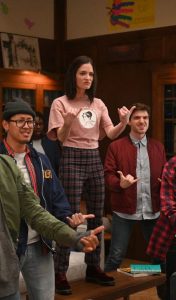
Zoey’s Extraordinary Playlist is being lauded for showcasing deaf talent and representation in its most recent episode, “Zoey’s Extraordinary Silence.” But as is typical for the medium, it was a biased, unrealistic portrayal.
If you’re hearing and watched the ninth episode this season – which aired April 6, 2020 – you likely recognized the song as soon as the instrumental began and maybe even remembered some of the lyrics. If you’re deaf and know ASL, you knew what the characters were “singing.”
Yes, the sign language-only performance of Rachel Platten’s “Fight Song” without lyrics or subtitles was dramatic and moving, and it’s great that actual deaf people were playing deaf people. But the fact is, the media gravitates toward American Sign Language, or ASL, because it’s so visual.
But if you’re deaf like me, raised to lipread and speak, you were completely out of the loop. How’s that for irony?
When I looked up the lyrics, they added an extra dimension to the performance. “Can you hear my voice this time? This is my fight song…”
Well, this is my fight song.
In the episode, Zoey’s father’s caregiver Howie’s daughter (you follow?) Abigail is deaf. When she visits Zoey at her workplace, Zoey’s colleague conveniently knows sign language and is able to interpret (otherwise they would have had to resort to cruder methods). About her dad, she signs, “Ever since I was little, he’s always tried to shelter me from the world and make me better, whether it was cochlear implants, hearing aids, or speech therapy. But when nothing fixed me, he was devastated.”
She adds, “He always made me feel like something was wrong with me. Then I went to college and met people who didn’t view their deafness as a weakness.”
I know parents like Howie exist. Thankfully, I know many more parents who are like mine. I was accepted, raised to be independent in society, and never made to feel like I was broken or needed to be fixed.
Since my congenital deafness was diagnosed at 14 months of age, I’ve worn hearing aids. As an adult, I got a cochlear implant, so now I have one of each. I had daily speech therapy from my diagnosis through high school.
Deaf Culture activists shy away from what they call a medical model of deafness, or reinforcing limitations rather than abilities. They think this perspective emphasizes the “loss” of hearing and strives to make the person be “normal.” This philosophy – which they associate with someone like me — is so far from my reality, it’s laughable. Even with my cochlear implant and hearing aid, I’m deaf. I still can’t appreciate music or understand what’s said on the phone. I’m reminded of my limitations every single day. But because of my parents and teachers, I’ve been able to reach my full potential. I would have had more limitations had I not been taught to lipread and speak.
Unfortunately, viewers who don’t know much about hearing loss wouldn’t know that people like me exist. In fact, 90 percent of children who are deaf are born to hearing parents, the vast majority of whom don’t know ASL – just like the rest of the world. In a family report of primary communication modality, the National Center for Hearing Assessment and Management found that 49 percent of families use listening and spoken language only, while only 3 percent use ASL only. The other percentages involve various combinations.
With advances like cochlear implants, listening and spoken language outcomes are even brighter – especially if implanted by age one. Kids are on par with their hearing peers when it comes to language, and don’t have the limitations older folks like me do.
The struggle between Howie and Abigail is that he’s scared to let her make her own choices and venture out into the world. Perhaps if he had given Abigail the right tools, he wouldn’t feel this way.
A deaf friend of mine who is an audiologist echoed my thoughts when she complained about the episode: “Just once, can we just have a TV show with someone who is deaf, wears CIs or hearing aids, and is happy to be able to speak? I am so tired of TV and movies playing into the same old tropes. We can’t keep feeling like we’re in the 1960s. The d/Deaf community is so diverse and it’s sad that we always get just one viewpoint.”
Can you hear my voice this time?